M.J. Johnson's Blog, page 3
September 3, 2016
Their Eyes Were Watching God
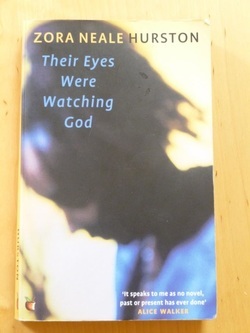 This book was chosen for the buddy read I take part in with some pals discovered on Twitter a few years back. We don’t exert any pressure on each other to complete the read within a set time period, although we always have an agreed kick-off date. There are no rules, and so far we’ve read books by writers previously unknown to us (certainly unread). What generally happens is that someone suggests a book and the others either agree with the choice or raise an objection - we’re all pretty amenable and accommodating, I suspect, because this establishing the next book phase usually only requires a few short tweets - so, If you’re the Genghis Khan type, inclined to dominate your sewing circle, please don’t consider joining our little reading group - otherwise, everyone’s welcome! The reason why I have so far enjoyed this twice-yearly interaction so much is because of the way it has introduced me to literature I might not have found otherwise.
This book was chosen for the buddy read I take part in with some pals discovered on Twitter a few years back. We don’t exert any pressure on each other to complete the read within a set time period, although we always have an agreed kick-off date. There are no rules, and so far we’ve read books by writers previously unknown to us (certainly unread). What generally happens is that someone suggests a book and the others either agree with the choice or raise an objection - we’re all pretty amenable and accommodating, I suspect, because this establishing the next book phase usually only requires a few short tweets - so, If you’re the Genghis Khan type, inclined to dominate your sewing circle, please don’t consider joining our little reading group - otherwise, everyone’s welcome! The reason why I have so far enjoyed this twice-yearly interaction so much is because of the way it has introduced me to literature I might not have found otherwise.I daresay, Their Eyes Were Watching God by Zora Neale Hurston (published 1937), is a prime example of a book I would never have experienced without the gentle encouragement of this group. The novel is related through a Southern Black dialect by an anonoymous narrator, telling the story of its main protagonist, Janie. The narrative takes place over approximately twenty-five years and describes Janie’s marriages with three different men. The first two relationships leave her unfulfilled, but she finds true love and a sense of spiritual enlightenment as an individual through the third marriage. The book was out of print for some years and was for a time condemned for its lack of political comment. It’s true, the book has no particular moral or political agenda, nor does it make any strong statement about race, although it certainly touches on race issues; it does however powerfully depict the struggle of the protagonist as an individual to inhabit her own voice. I have never read another novel that is anything remotely like Their Eyes Were Watching God, and in this respect it is unique. The book does however have some flaws, and a number of passages that I felt might have read so much better had they been whittled down - the mule dialogue for instance. The book does however contain some wonderfully poetic images that managed to fill my head with pictures as I read.
The years took all the fight out of Janie’s face. For a while she thought it was gone from her soul. No matter what Jody did, she said nothing. She had learned how to talk some and leave some. She was a rut in the road. Plenty of life beneath the surface but it was kept beaten down by the wheels. Sometimes she stuck out into the future, imagining her life different from what it was. But mostly she lived between her hat and her heels, with her emotional disturbances like shade patterns in the woods - come and gone with the sun. She got nothing from Jody except what money could buy, and she was giving away what she didn’t value.
Unique. Poetic. Definitely worth reading.
Published on September 03, 2016 09:48
July 27, 2016
Book Catch-Up
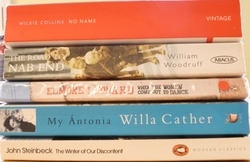 Like at least half the population of the UK I was really thrown by the Brexit result. I planned to write a piece about it, perhaps I shall, but at the moment my feelings surrounding the whole referendum thing are still too raw, and this blog was never meant to become a rant platform or an opportunity for spitting vitriol. The first weekend after the vote I wrote this on Facebook, which basically sums up the way I felt at the time:
Like at least half the population of the UK I was really thrown by the Brexit result. I planned to write a piece about it, perhaps I shall, but at the moment my feelings surrounding the whole referendum thing are still too raw, and this blog was never meant to become a rant platform or an opportunity for spitting vitriol. The first weekend after the vote I wrote this on Facebook, which basically sums up the way I felt at the time:“No point feeling depressed any longer about Brexit. Happily readjusting to living back in the 1970s. Looking forward to a nice prawn cocktail followed by a Vesta Beef curry and then we're planning to settle down to an episode of Love Thy Neighbour with Jack Smethurst and Rudolph Walker. Laugh!”
As for David Cameron and his cowardly resignation after recklessly allowing the referendum to happen in the first place, I feel angry still. I felt somewhat sickened when his sycophantic Tory chums described his arrogant foolishness as ‘a brave decision’ and talked of the great courage he’d shown as their leader ... grrrr!
But I’m not going to talk Brexit ... well, not anymore. I’ve read a number of very good books over this period, so here’s a brief appraisal of them:
My Ántonia - by Willa Cather
This is a powerfully evocative novel about home, love and friendship by a wonderful writer. It is written from the perspective of the book’s sympathetic narrator, Jim Burden, who at the age of nine arrives at his grandparents’ farm in Black Hawk, Nebraska, and becomes smitten by the ‘force of nature’ that is Ántonia from the first moment he sets eyes upon her. The book is far more than just a love story though. The characterisations are richly satisfying and it left me with a powerful sense of place and time. Cather helps the reader understand, through her straightforward but nearly perfect prose, the strains, hopes and dreams of the immigrant settlers who inhabit her landscape, and gives us an insight into the fears and old oppressions they are fleeing from. This is one of those rare books that once reaching its end you could happily return to the beginning and start over. Excellent.
The Winter of Our Discontent - by John Steinbeck
This was Steinbeck’s last novel - not however his final book. It has been sadly overlooked possibly because it received some very mixed reactions at the time of publication. Don’t let this put you off. This is a very finely-crafted work, which seems particularly appropriate at this moment in time after the greed demonstrated by banks, corporations and individuals in recent years. Steinbeck makes a small East Coast town his backdrop for the moral dilemma that grocery clerk Ethan Hawley faces in this story. It is a morality tale. The writing is first rate. Definitely amongst my favourite Steinbeck novels and seriously underrated. Recommended.
The Road to Nab End - by William Woodruff
Autobiographical account of a childhood spent in Blackburn, a Lancashire cotton- weaving town in the early twentieth century. Woodruff never writes sentimentally about the terrible hardships these working-class people faced throughout the depression years. Unusually for an autobiography I found it utterly compulsive reading. It is the first of two parts and I definitely mean to read its sequel . A very fine slice of social history without the lecture; a masterfully-written account of an impoverished childhood. Superb.
When the Women Come out to Dance - by Elmore Leonard
These short stories are deliciously entertaining, great characterisations, lean prose, not a word out of place. Great fun to read.
No Name - by Wilkie Collins
This was considered pretty scandalous in its day because it deals with the subject of illegitimacy. It tells the story of Magdalene and Norah Vanstone, who are disinherited because of the sudden deaths of their parents. The family money which was intended to be shared between them goes to a miserly cousin who treats them with utter contempt. The sisters have very different personalities: Norah humbly accepts her lot in life and seeks work as a governess; Magdalene (the name’s a bit of a give-away - but this is nineteenth century literature!) seeks to regain her family fortune.
If you’ve read any Wilkie Collins before, you can expect a great cast of characters: misers, wicked housekeepers, scoundrels with a heart of gold and naval men with hearts of oak. It’s great stuff!
So, there you have it - everything I’ve read since I last posted a blog.
On 1 August I’m taking part in a summer buddy read with some chums I discovered on Twitter. Anyone can join in. We do two books a year. The current choice is Their Eyes Were Watching God by Zora Neale Hurston. Basically all you have to do is get a copy and start reading on that date; no time limit, write a blog or leave a review and get in touch. It’s fun!
Published on July 27, 2016 01:34
June 9, 2016
The Wettest Holiday Ever!
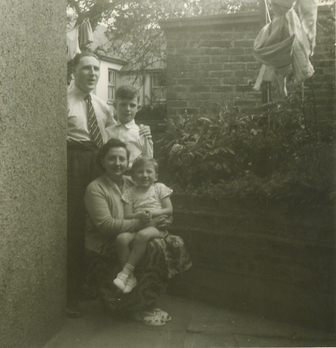 In 1960 we looked like this Holiday time approacheth ...
In 1960 we looked like this Holiday time approacheth ...Memories of childhood are notoriously imprecise, but certain things, whether entirely accurate or not, somehow lodge themselves in the brain and refuse to budge. One such recollection is a family holiday to the Welsh seaside town of Porthcawl during what must have been the summer of 1960, when I was five/six. Porthcawl was considered the holiday mecca for us Valleys folk; in fact, it was impossible to visit the place without bumping into someone you knew from home - no place then to fly off to for an illicit weekend liaison, not that such thoughts would have had any place in my innocent mind back then; any fantasies I entertained were wholly confined to fighting injustice and righting wrongs like my heroes the Lone Ranger and his ever-faithful Indian companion Tonto.
Wales, a mountainous place with a large coastline, is famed for its rain. I’ve heard it rumoured that some of our sheep, if not a few of the locals in some rural parts, are web-footed. Back in the Porthcawl summer of 1960 a natural proclivity for an amphibious lifestyle would have come in useful. I wouldn’t entirely trust my own memory here; my parents however always maintained that over a two-week holiday we did experience fourteen days of almost non-stop rain. The first week we boarded with a lovely lady called Mrs Jones (the names of both saints and sinners were always faithfully recorded by my late mother); the second week, we suffered the misfortune of lodging with a Mrs Martin. Mrs Martin was a widowed lady who quite evidently detested children, which naturally didn’t bode too well for my brother and me. Even my father, normally big-hearted, found his good nature put to the test by this woman; Mrs Martin was more strict Victorian governess than welcoming hostess, and to top it all, she was a rotten cook to boot - this is probably what riled Dad the most! I think Dad regarded a bad cook as a work of the Devil (well, not far off!). I recall him, after one of numerous inedible meals, gruffly muttering to my mother that perhaps the late Mr Martin had gone to his heavenly reward after consuming one of his wife’s dinners.
Mrs Martin’s guest house truly was cold and unwelcoming. In those days, families like us who lived on modest incomes purchased their own food and had it cooked for them by their hostess. I’ve no idea what this practice was called, eventually it was of course succeeded by B&B and half-board. I have a feeling it may have been called something a bit misleading like ”All found”. So, our domestic situation only made matters worse; outside it continued to rain and inside the guest house we were subjected to Mrs M’s culinary abuse and sneering dislike of children. One evening, shortly before the evening meal, Mrs Martin accused my brother and myself of vomiting over her bathroom and leaving it in a terrible mess. She was very condemnatory and quite scary in her manner I recall. My mother, like all good mothers, would not stand for her ‘chicks’ to be maligned thus, “I can assure you, Mrs Martin, that It wasn’t either of my boys!” she protested. “Who on earth was it, then?” sneered the awful Mrs M, “I don’t know,” replied Mam on the verge of tears, “But it wasn’t either of my boys!” At the same moment as Mrs Martin scoffed scornfully at this, a plaintive voice called down from the landing upstairs, “It was me!” a frail male voice called out. The Joneses were a kindly, elderly couple from the Rhondda who were the only other paying guests in the house. “I’m very sorry, it wasn’t the boys, I was taken ill and I was about to clean up the mess!” Mrs Martin looked appropriately shamefaced as she shuffled away from my mother who was standing guard over her boys, proud and victorious. As far as my brother Ian (seven years older than myself) was concerned, the confrontation was the final straw. The next morning he caught the bus back to my grandparents’ house. I don’t recall him coming on a family holiday again - Mrs Martin had been the line in the sand for him!
I don’t think I gave my swimming trunks an airing at any time over that holiday, but I did manage a few paddles in the odd rock pool between cloudbursts. One evening we went to see the variety show at The Grand Pavilion. I remember Dad particularly enjoyed the comedian, and was still telling a joke he heard that night about a family of rabbits thirty years later. The local cinema had only one offering as I recall, Peter Cushing and Christopher Lee in the 1958 Hammer version of Dracula. It had an X certificate (i.e. eighteen and over!) so no good for me, in fact I recall my hair standing on end just looking at the black and white stills that were displayed in a glass case outside the cinema. The large shelter on the promenade with its multiple rows of benches was filled to capacity every day. Each day we did the same circuit of shops around the town - Woolworths was by far the best, of course, and hours were spent browsing its aisles. Every day we’d have a Fulgoni’s ice-cream cone or two; we’d generally escape the rain mid-morning and mid-afternoon by going to a cafe to have cups of tea for the grown ups and a glass of pop or a milk shake for us. Sometimes, to avoid Mrs Martin’s meals we’d have faggots and peas from the stall in Coney Beach (to allay the concerns of American readers here, faggots are a ball of minced lamb and offal, traditionally served with mushy peas) or Mam’s lifelong favourite, fish and chips. I think the putting green, a traditional holiday pursuit, and still surviving in Porthcawl to this day, was waterlogged and closed up those weeks, I certainly don’t recall us playing. But not all was lost, on the last night of the holiday I was taken to the fair and allowed to go on half a dozen rides and to spend any pocket money my grandparents had pressed into my hand before leaving.
One of the best things I remember was going out one evening after dark when it was high tide and dodging the waves that surged into the air like a blowing whale and left its spume washing across the promenade.
Here is Another Porthcawl story
Published on June 09, 2016 09:24
June 2, 2016
Gilgamesh
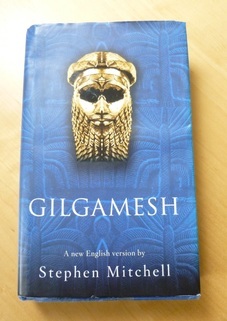 Driving to work one morning my wife almost ran over a book. Yes, a hardback book, strange but true. Just imagine what this meant for a book fanatic like Judith - books materialising out of nowhere and suddenly appearing on her path?
Driving to work one morning my wife almost ran over a book. Yes, a hardback book, strange but true. Just imagine what this meant for a book fanatic like Judith - books materialising out of nowhere and suddenly appearing on her path?She naturally pulled into the side of the road to try and see if she could help. Its cover was slightly bent and Judith did what any book-lover is duty-bound to do - brought it home so it could be treated for shock and duly nurtured. The gentle reader will be delighted to learn that the aforementioned book has since found happiness and fulfilment amongst others of its species upon our bookshelves.
The book was Gilgamesh: A New English Version by Stephen Mitchell.
“That’s the oldest story ever written down,” I exclaimed when she brought it home.
“I know,” she said, “I found it in the middle of the road.”
“Wow,” I said, “I’ve always wanted to read it.”
“Here’s your chance,” she said, passing me the book.
It’s pretty ridiculous to rate a book that is actually older than The Bible by a system of stars, one to five! The poetic text in English by Stephen Mitchell is far easier to regard objectively and review. For my money he has done an excellent job of bringing together literal translations of the surviving fragments of Sumerian,Babylonian and Akkadian texts and working them into an agreeable epic poem by adopting a certain amount of artifice, which he freely admits to in his introduction.
This is a morality tale about the tragedy of human existence. When we first meet Gilgamesh we are told of his tyranny and how he oppresses the people in his kingdom, the walled city of Uruk. The people petition the Gods to temper their king’s abuses, and the responsive Gods duly send Enkidu, a kind of wild man, who is very nearly Gilgamesh’s physical equal, to restore balance to the world. It is interesting that as the story proceeds, and after they’ve become friends, they develop the attributes of each other - a bit like people are said to do in a marriage, and the text most certainly has a homo-erotic quality.
Gilgamesh is later forced to suffer bereavement and loss when his friend Enkidu is chosen by the Gods to die as a punishment for Gilgamesh’s wanton destruction of Humbaba, a monster entrusted by the Gods with the task of guarding the Cedar Forest and for killing the Bull of Heaven. Gilgamesh is so heart-broken after the loss of Enkidu that he wanders the world in despair. Eventually, he perks up a little and goes on a highly perilous journey to find Utnapishtim to see if he can learn the secret of eternal life. Utnapishtim tells him about the great flood (Noah’s Ark but predating the biblical version) and assures him that eternal life is impossible and its secret belongs to the Gods alone. Finally, he returns home to the walled city of Uruk as its rightful king. He has acquired some wisdom and perhaps the knowledge, known to the mystics and sages througout the ages, that man’s life can only be lived in the present.
What this poem tells me is that almost five thousand years ago, when the earliest of these tales were first conceived and written, human beings were largely concerned with the same issues as they are now.
A very successful roadside rescue indeed, I think.
Published on June 02, 2016 08:20
May 12, 2016
Frankenstein by Mary Shelley and Some Other Thoughts
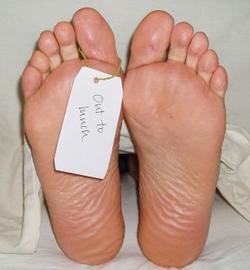 I am sometimes appalled to hear educators declare that teaching the classics of English literature in our schools should be abandoned because they hold no relevance for modern children. I firmly believe that anyone who truly wishes to understand the development of language and writing needs to possess a firm grasp of of our literary heritage. The famous quotation from Sir Isaac Newton to Robert Hooke acknowledging his indebtedness to others, “If I have seen further it is by standing on the shoulders of giants,” can be applied to any discipline just as easily as science. There would be no detective/thriller genre if Wilkie Collins hadn’t created books like The Woman in White and The Moonstone (just imagine what prime-time TV would ever have done then, even more reality and game shows perhaps?), without H Rider Haggard there would be no Lost World genre (Tarzan would still be apeing about in the jungle and there would be no Jurassic Park!). If John Polidori’s The Vampyre hadn’t influenced Bram Stoker, then there may never have been a Dracula, and Stephen King wouldn’t have written Salem’s Lot. The whole Fantasy genre basically stems from the pen of one man, J R R Tolkien, who had himself been inspired by the Norse myths. On a personal note, I most definitely couldn’t have written Niedermayer & Hart or Roadrage without following the bright trails that lead back to their many rich sources. Anyone who claims total originality is I think deluding themselves. However, there is a big difference between following themes or traditions and direct, deliberate plagiarism.
I am sometimes appalled to hear educators declare that teaching the classics of English literature in our schools should be abandoned because they hold no relevance for modern children. I firmly believe that anyone who truly wishes to understand the development of language and writing needs to possess a firm grasp of of our literary heritage. The famous quotation from Sir Isaac Newton to Robert Hooke acknowledging his indebtedness to others, “If I have seen further it is by standing on the shoulders of giants,” can be applied to any discipline just as easily as science. There would be no detective/thriller genre if Wilkie Collins hadn’t created books like The Woman in White and The Moonstone (just imagine what prime-time TV would ever have done then, even more reality and game shows perhaps?), without H Rider Haggard there would be no Lost World genre (Tarzan would still be apeing about in the jungle and there would be no Jurassic Park!). If John Polidori’s The Vampyre hadn’t influenced Bram Stoker, then there may never have been a Dracula, and Stephen King wouldn’t have written Salem’s Lot. The whole Fantasy genre basically stems from the pen of one man, J R R Tolkien, who had himself been inspired by the Norse myths. On a personal note, I most definitely couldn’t have written Niedermayer & Hart or Roadrage without following the bright trails that lead back to their many rich sources. Anyone who claims total originality is I think deluding themselves. However, there is a big difference between following themes or traditions and direct, deliberate plagiarism.I’ve just read Mary Shelley’s Frankenstein or, the Modern Prometheus, for the first time (published 1818 - and acknowledging its debt to Greek mythology in the title). It is of course the original mad scientist scenario that has since become a stalwart of just about every form of popular culture. The story, then not a hundred years old, first made it to the cinema screens as far back as 1910 - we just love to be horrified! The book might be loosely classified as science fiction too, and its influence on art and literature has been incredibly far-reaching. As a novel it most certainly deserves its classic status. The book’s basic premise of man taking on the role of God has cross-bred with other genres: combine a mad scientist and lost world theme and you get Jurassic Park, mix mad science that creates computers who themselves create horrific human-like machines and you have the Terminator series, perhaps even Tolkien had something of the book in mind when he has Saruman create the Uruk-Hai.
Mary Shelley was born Mary Godwin in 1797, the daughter of the feminist writer Mary Wollstonecraft and writer and journalist William Godwin. Her mother died soon after she was born, and Mary received no formal education and doesn’t seem to have taken very well to her step-mother. She began an affair with the poet Percy Bysshe Shelley when still a teenager and eloped with him to the (then war-torn) Continent. She began writing Frankenstein in 1816 whilst holidaying on Lake Geneva ; by this time she had lost her first baby and had given birth to a son (sadly not to survive either). They were assailed by weeks of rain, and their chum Lord Byron suggested to the group of friends present, that they each compose a horror story to pass the time. The rest is, as they say, history.
The story is well written and has withstood the test of time. The monster of her tale undertakes to do many cruel and vindictive acts in revenge upon his creator Frankenstein; yet it is the monster who is given the last word in the novel by Shelley, and it is for him that we feel the deepest sympathy. Frankenstein never acknowledges his responsibility as creator, and simply abandons his creation which he finds too abhorrent to even gaze upon. The monster subsequently wanders the world like a lost child receiving only cruelty, unkindness and hatred from mankind who he yearns in his heart to join. Is the monster in this story the creature, or the human ego?
We stand at a point in time where such matters are no longer far-fetched. Whilst our governments can attempt to reassure us that any genetic experiments are only carried out with the utmost care and with every attention paid to what is both morally and ethically right ... we know too that once the genie is out of the bottle ...
I wrote a blog some time back that was based on the National Theatre’s production of Frankenstein.
And on a lighter note - one of my favourite comedy films, Young Frankenstein.
Published on May 12, 2016 02:28
May 3, 2016
Musical Weekend
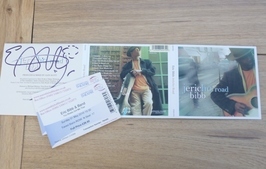 My wife is currently reading the autobiography of Helen Keller, who, from a very early age, lost both her sight and hearing. I simply can’t imagine what that must be like - a very different kind of life I guess, though, certainly in Keller’s case, not without joy and a sense of fulfilment . It’s hard for anyone born (especially since the invention of broadcast sound) to conceive of a life without music; it’s all around us a lot of the time. Just step into the garden a moment: hear the radio blaring from the guys working on the loft conversion in the next street, the pounding bass of a passing car as it drives by, or the sound of a child practising piano scales.
My wife is currently reading the autobiography of Helen Keller, who, from a very early age, lost both her sight and hearing. I simply can’t imagine what that must be like - a very different kind of life I guess, though, certainly in Keller’s case, not without joy and a sense of fulfilment . It’s hard for anyone born (especially since the invention of broadcast sound) to conceive of a life without music; it’s all around us a lot of the time. Just step into the garden a moment: hear the radio blaring from the guys working on the loft conversion in the next street, the pounding bass of a passing car as it drives by, or the sound of a child practising piano scales.A running theme of our past Bank Holiday weekend seems to have been popular music - not intentionally planned though, things simply fell out that way. We’d booked several months back to see Eric Bibb in concert at the Assembly Hall in Tunbridge Wells. We possess several of his albums and have always enjoyed listening to these, so it was very satisfying to get an opportunity to catch him live. He is a highly accomplished blues performer, a beautiful songwriter with a distinctive and very pleasing voice. On Sunday evening he had a band of excellent musicians and backing vocalists accompanying him. His daughter Yana Bibb, a skilled jazz vocalist, provided the support for the first part of the evening. The Bibb family are something of a musical dynasty: Eric Bibb’s father Leon was very active in the New York folk music scene of the 60’s, his godfather was the legendary Paul Robeson and his uncle was the jazz pianist and composer John Lewis. You get the feeling that the musical luminaries of the sixties like Bob Dylan, Judy Collins, Odetta etc regularly dropped by the Bibb family home like my mother’s neighbours in the valleys of South Wales used to pop round to borrow a cup of sugar. Eric Bibb himself moved to Sweden in the Seventies and now lives in Finland. I see one of the dates he has for his current tour is Porthcawl in South Wales - a favoured holiday destination of my family’s when I was a child. I’d love to see him again if I had the opportunity and excuse to pay a visit to Wales at the end of the month! He’s playing at a number of locations all over the UK - so I hope you take the opportunity to see him. Check out Eric Bibb's website for details.
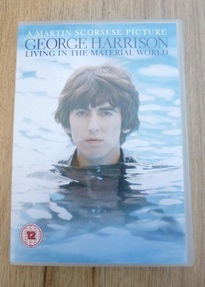 The reason why I said our weekend had a musical theme was because we also watched the George Harrison documentary, Living in the Material World, directed by Martin Scorsese. This is a film in two parts, beautifully realised through hundreds of clips and interviews with those who knew George. If you grew up in the Sixties as I did, The Beatles were inescapably part of your life. And George, the youngest of the four, was in many ways the most fascinating and complex character, often upstaged by Paul and John in the song-writing stakes, he too created some wonderful songs including Something, While My Guitar Gently Weeps, My Sweet Lord and dozens more. If you haven’t seen this film (I’d caught about half of the second part on TV a few years back)and if you’re interested in The Beatles, The Sixties, George Harrison, or all three, this is an excellent film which I can highly recommend.
The reason why I said our weekend had a musical theme was because we also watched the George Harrison documentary, Living in the Material World, directed by Martin Scorsese. This is a film in two parts, beautifully realised through hundreds of clips and interviews with those who knew George. If you grew up in the Sixties as I did, The Beatles were inescapably part of your life. And George, the youngest of the four, was in many ways the most fascinating and complex character, often upstaged by Paul and John in the song-writing stakes, he too created some wonderful songs including Something, While My Guitar Gently Weeps, My Sweet Lord and dozens more. If you haven’t seen this film (I’d caught about half of the second part on TV a few years back)and if you’re interested in The Beatles, The Sixties, George Harrison, or all three, this is an excellent film which I can highly recommend.
Published on May 03, 2016 12:10
April 17, 2016
Radio Four
 I've been decorating over the past week or so - trying to catch up with the stuff I pretend isn't waiting to be done when I'm busy writing. I'm not a great fan of the paintbrush, if the truth be told, however, I have been grateful for the opportunity to listen in to more on the radio. When I say radio I am naturally referring to BBC Radio 4. We generally wake up to Radio 3, the classical station, as the other half dislikes opening her eyes (ears!) to the full-on confrontation that is the Today news programme on 4.
I've been decorating over the past week or so - trying to catch up with the stuff I pretend isn't waiting to be done when I'm busy writing. I'm not a great fan of the paintbrush, if the truth be told, however, I have been grateful for the opportunity to listen in to more on the radio. When I say radio I am naturally referring to BBC Radio 4. We generally wake up to Radio 3, the classical station, as the other half dislikes opening her eyes (ears!) to the full-on confrontation that is the Today news programme on 4.The variety of programmes on Radio 4 is always astonishing, and as someone who rarely watches television I think I'd happily pay my BBC licence fee for this service alone, which has managed to both educate and entertain me over many years. If only I could write and listen to radio programmes at the same time! Alas, during periods of writing the radio has to be switched off until I break at lunchtime (here I must confess to having been hooked into the Helen & Rob marital abuse storyline of late in Radio Four’s daily soap The Archers!). I've really enjoyed some of the drama offerings, especially Killing Time by Peter Jukes, starring Lenny Henry, and The Clerks' Room by Janice Okoh, plus a number of one-off plays and some serials like Home Front, about the First World War, which relates itself to a day exactly a hundred years ago. But the Radio 4 diet is completely omnivorous, and this week I've also particularly relished hearing Thinking Allowed and The Media Show.
There is one fifteen minute programme that I've found immensely engaging though, and I'm so glad I didn't miss any of it: Free Speech, written and presented by Timothy Garton Ash. Basically this is a series of essays on a subject I truly believe we should all feel passionate about - the hard won right to express ourselves without prejudice. This is a terrific short series and I can highly recommend listening to it.
So, mostly thanks to BBC Radio, the decorating has been getting along nicely and relatively pain-free!
Published on April 17, 2016 08:35
April 2, 2016
Gales, Fence Posts, Aussie Literature and Bexhill-on-Sea
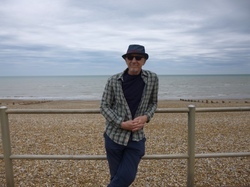 I haven't written a blog for weeks, not because I didn't want to, or ran out of ideas, simply because I needed the time for other stuff. My overall writing hours have reduced by about eight hours a week, because at the moment I spend one day a week working on my house. Readers of this blog may recall that a while back we had quite extensive work done to the exterior. This in itself had consequences, which resulted in quite a lot of re-plastering and repair work becoming necessary on the inside. That has mostly all been completed, but unfortunately every room still requires some decorating, and the phrase employed here 'requires some decorating' generally means ' needs completely redecorating'. So, one day a week, I do the job I most dislike, put on my hair shirt (tendency to badly overdramatise), and get decorating! Okay, it's not that bad - it beats eight hours down a pit!
I haven't written a blog for weeks, not because I didn't want to, or ran out of ideas, simply because I needed the time for other stuff. My overall writing hours have reduced by about eight hours a week, because at the moment I spend one day a week working on my house. Readers of this blog may recall that a while back we had quite extensive work done to the exterior. This in itself had consequences, which resulted in quite a lot of re-plastering and repair work becoming necessary on the inside. That has mostly all been completed, but unfortunately every room still requires some decorating, and the phrase employed here 'requires some decorating' generally means ' needs completely redecorating'. So, one day a week, I do the job I most dislike, put on my hair shirt (tendency to badly overdramatise), and get decorating! Okay, it's not that bad - it beats eight hours down a pit!But there's a ray of light at the end of every tunnel: I'm only days away from completing the draft of the book I'm currently working on. It's quite a complex story, with two strands running parallel to each other like its predecessor Niedermayer & Hart (reviews) . I'm excited for two reasons: it's always a relief to reach the end of a long piece of work, and secondly, because the book is now in such an advanced state that I'm quietly confident I have something which will satisfy the many fans of the earlier work. If you haven't read Niedermayer & Hart , now's your chance, and if you have read it and it wasn't to your taste (takes all sorts to make a reading world!) I hope I'm speaking for most writers when I say please don't take it too personally! Sometimes when I look at reviews on Amazon I'm truly aghast at some of the comments made on one star ratings relating to a product, giving reasons such as: because it arrived later than guaranteed, or the packaging was damaged, or because you hadn't realised you had a region 2 DVD Player and you bought a region 1 DVD. Although, especially to the independent author, the star rating system is a vital tool for marketing books, I guess the best writers can hope for is that most potential readers will, as I do, take the majority's view as the best guide, for everything from books to hotels to coffee grinders!
The one star reviewer can take his/her axe to anything it seems. Even the beautifully written, wonderfully engaging Harp in the South trilogy by Ruth Park isn't immune. I discussed buddy reading the first book she wrote in the series in my previous blog, which turned out to be the second part in the final story order. I personally chose to read the books as they were written, and I'm glad I did, simply because Park, I think, became more confident as a writer over the thirty years between Poor Man's Orange and Missus (first chronologically but written last). This is a lovely series of books, deeply insightful into the lives of the Irish/Australian Catholics who inhabit their pages without ever becoming either too romancified (could that possibly be a word? Should be if not!) or doomed never to get a break and to suffer pain and torment for all eternity like the characters in a Cormac McCarthy novel. If you enjoy good writing and well-drawn characters you really care about that are never stereotypical, I strongly recommend this series. My buddy reading comrades all agreed.
And finally to some thoughts on Bexhill-on-Sea and fence-posts: the wife and I paid an Easter Sunday visit to my mother-in-law in her nursing-home last weekend. She's ninety-two, and sometimes, as on this visit, she has a sleepy day. I think it's just that the battery gets run down, and when it does it takes a long time to charge up. Anyway, we've learned to accept things as they are and to be grateful that she's well and happy, and when she is fully alert she can still read half a dozen books in a week and make you wish you'd paid more attention to the dictionary when you play her at Scrabble. We had a lovely bracing walk along the seafront and had a nice coffee at Reillys cafe with my brother-in-law. 'Storm Katie' continued overnight and we woke to find two fence-panels down in the morning - let's hope our climbing rose and clematis will recover!
Published on April 02, 2016 03:50
February 13, 2016
Buddy Read - The Harp in the South
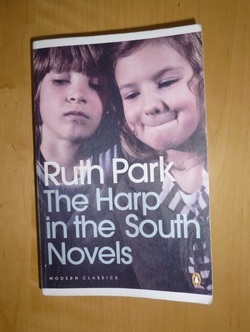 I think I mentioned a few weeks back that I was about to take part in a buddy read of The Harp in the South by Ruth Park. A few of us on Twitter choose a book unread by us all, (often an unexplored author too) and we start reading on a set date - no rules really, other than we only do a title every six months - this is because reading has to be a pleasure, not a chore!
I think I mentioned a few weeks back that I was about to take part in a buddy read of The Harp in the South by Ruth Park. A few of us on Twitter choose a book unread by us all, (often an unexplored author too) and we start reading on a set date - no rules really, other than we only do a title every six months - this is because reading has to be a pleasure, not a chore!This book was suggested by our Australian member* and I think all of us feel really pleased about it, because we found it a hugely enjoyable book. The Harp in the South (published 1948) is actually the second book in a trilogy, although it was written first. The success of the novel was followed by Poor Man’s Orange (1949 - last book in trilogy) and Missus, the first book in the trilogy but actually written very much later, in 1985 in fact. I had no idea until I read, in the aforementioned review, that the (Harp in South) book was the winner of a newspaper competition and serialised in the Sydney Morning Herald in 1947. It’s not difficult to believe it won, because it really is so very well wrritten; it perhaps also explains the slightly episodic nature of the narrative, which might be viewed as a flaw in the writing until you’re aware of that fact. The novel, perhaps surprisingly today, was seen as controversial when it first appeared, many arguing that Park had made up the slum life we experience through the lives of the Irish Catholic Darcy family who are central to her book. Park attested to the book’s authenticity, having herself lived in a tenement in the Surry Hills area of Sydney with her husband when first married.
The book is set at the time it was written, which certainly took this reader by surprise, probably because of the acute poverty experienced by its cast of characters. Initially (because the period isn’t stated), I thought it was set in the early 1930s or even earlier, but oblique references to Lana Turner etc put me on the right track. What really came across for me was the tolerance and care these people demonstrate for each other, how despite everything they somehow manage to uphold their standards of decency, despite the plodding grimness of their lives. It’s hard to believe (from our cosseted lives today) how a day’s outing to the seaside could have been seen as a momentous occasion. There is tragedy, ugliness and despair here, but there are also many light-hearted moments, and the book left me feeling exhilarated and uplifted. The writing itself is excellent and Park’s descriptions are always beautifully crafted.
Ruth Park (1917- 2010) was actually a New Zealander by birth and was no stranger to poverty, having grown up through the Depression there. She was a prolific writer, wrote several novels including many books for children and produced literally thousands of radio scripts. She died at the fine age of ninety-three.
If like me you were almost completely ignorant when it came to Antipodean literature, then add this title to your TBR pile. Or, just add it simply because it’s a very good book. I’m delighted to have found a new author and especially happy because I still have two parts of the trilogy left to go. Woohoo!
* Caffeine and Chapters review
Published on February 13, 2016 03:11
January 31, 2016
Making Room for the New
Published on January 31, 2016 12:50

 I wrote a (slightly tongue-in-cheek) blog recently about The Life-Changing Magic of Tidying, a simple, effective way to banish clutter forever by Marie Kondo (see
I wrote a (slightly tongue-in-cheek) blog recently about The Life-Changing Magic of Tidying, a simple, effective way to banish clutter forever by Marie Kondo (see 

